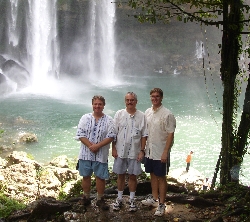University News
School of Ag/IIRA Capacity Building Project Recognized by USAID; Funded for Additional $300,000
February 18, 2011
MACOMB, IL -- A Western Illinois University project was recently recognized by the United States Agency for International Development (USAID) as one of the most successful projects funded worldwide by the agency over the past three years. The project, "Capacity Building in Southern Mexico," co-directed by Winthrop Phippen, professor in Western's School of Agriculture; Christopher Merrett, director of the Illinois Institute for Rural Affairs (IIRA); and John Gruidl of the IIRA, provided help to small farm and business operations in Chiapas, Mexico. Phippen noted, because of its success, the WIU project will receive an additional $300,000 in funding from USAID to expand its work over the next three years.
"It was quite a surprise when I got the call from USAID," said Phippen. "It's very unusual for an agency to extend a project for an additional three years."
According to Phippen, the project, which started in 2006, focuses its efforts on the Universidad Technológica de la Selva (UTS), a university in the rural, southern Mexican state of Chiapas. The project has increased the capability of UTS to help small businesses by training its faculty members and students.
"For example, Chris and John have led several initial workshops in Chiapas to train faculty on effective outreach methods and also to help faculty organize into effective outreach teams," Phippen said.
Additional workshops have been led by other WIU faculty and by faculty from Universidad Autónoma de Querétaro (UAQ), a university in central Mexico. As a result, UTS went on to provide technical assistance to small, rural producers, especially coffee and milk producers, and small eco-tourism centers.
"Forty-eight workshops have been provided by UTS faculty to rural producers, on topics such as improving production methods, developing marketing plans and attracting international tourists," Phippen noted.
"Although collaborating with universities and community developers working outside the United States allows us to share our expertise and experience, we find that we also gain important insights on the issues common to all rural areas. We believe that we gain as much as we contribute," Merrett added.
One of the most significant outcomes of the project has been the creation of a Center for Rural Development at UTS, which will provide economic development assistance to the region. Bringing their extensive IIRA experience in working with rural communities, Merrett and Gruidl conducted several workshops to help set up the operation and management of the center. Gruidl noted, however, that Chiapas was not the only beneficiary of the project.
"The learning was definitely a two-way street," Gruidl explained. "We learned from the UTS faculty and were inspired by their dedication. They are well-equipped to help local producers, since faculty have many practical skills and knowledge in dairy operations, coffee production and indigenous languages."
The outcomes from the project also include other training opportunities for UTS faculty and students. Seven faculty members have earned master's degrees at WIU, eight faculty members completed research projects at WIU and 45 undergraduate students participated in entrepreneurship and English training at WIU.
Phippen noted that Jo Davis, from Western's Global Opportunities unit in the College of Business and Technology, has played a pivotal role in the project by managing the complicated travel and communications logistics. He also noted that he is already looking toward the project extension.
"In the next phase of the project, we plan to expand our programming to include livestock, dairy and small-business owners. We will also be creating a new mentorship or 'coaching' program by having successful entrepreneurs work with next-generation producers to guide them through the many hurdles of establishing a business," Phippen explained. "An additional 45 undergraduate students and seven graduate students will be studying at WIU for the next three years. WIU and the surrounding area offer tremendous opportunities to see examples of successful agricultural businesses."
For more information about the TIES project, contact Phippen at (309) 298-1251 or
WB-Phippen@wiu.edu, or visit wiu.edu/globaled/cbuilding/index.php. Learn more about the IIRA at www.iira.org.
Posted By: University Communications (U-Communications@wiu.edu)
Office of University Communications & Marketing


Connect with us: